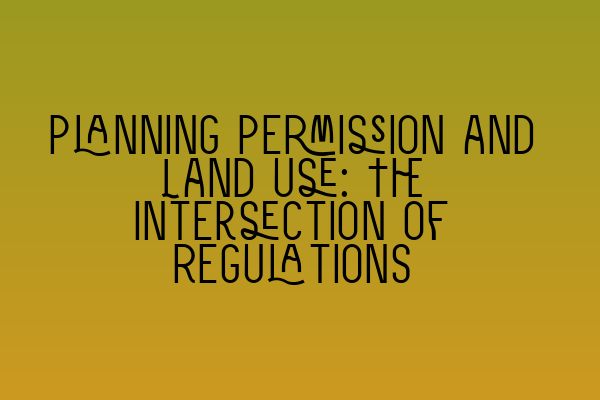Planning Permission and Land Use: The Intersection of Regulations
When it comes to property development and land use, understanding planning permission and the regulatory framework surrounding it is crucial. Whether you are a property developer, a landowner, or a prospective buyer, navigating the complexities of planning permission is essential to ensure compliance and avoid legal challenges.
In this article, we will explore the intersection of regulations in planning permission and land use, providing you with a comprehensive guide to understanding the processes involved and the key considerations to keep in mind. By the end of this article, you’ll have a solid foundation in planning permission and be better equipped to navigate the complexities of property development in the UK.
The Importance of Planning Permission
Planning permission is the process through which the local planning authority grants permission for a proposed development or change in land use. It is a legal requirement in most cases and ensures that developments are carried out in accordance with the policies and regulations set out by the government.
Without planning permission, any development or change in land use can be deemed unlawful, and you may face enforcement action, fines, or even demolition of the development. Therefore, it is essential to obtain planning permission before proceeding with any significant property development projects.
The Role of Local Planning Authorities
Local planning authorities (LPAs) are responsible for assessing and deciding on planning applications within their jurisdiction. They play a crucial role in ensuring that developments align with the local and national planning policies.
LPAs consider various factors when assessing planning applications, including the impact on the local community, the environment, and the overall sustainability of the proposed development. They may also consult with key stakeholders and the public during the decision-making process.
It is important to engage with the LPA early in the planning process to understand their requirements and seek their guidance. This can help streamline the planning application and increase the chances of a successful outcome.
The Planning Permission Process
The planning permission process typically involves the following key stages:
- Pre-application stage: This involves engaging with the LPA to discuss the proposed development, understand their requirements, and seek their advice. This stage helps identify any potential issues or constraints early on.
- Submission of planning application: Once the proposal is finalized, a formal planning application is submitted to the LPA. The application includes various documents, such as architectural plans, environmental impact assessments, and supporting reports.
- Public consultation: Depending on the nature and scale of the development, the LPA may undertake a public consultation process. This allows local residents and stakeholders to express their views and concerns.
- Assessment and decision: The LPA considers the application, taking into account the relevant policies and guidelines. They may also consult with other agencies, such as environmental bodies and highways authorities. The decision can be either approval, refusal, or the application being referred for further review.
- Appeals and reviews: If the planning application is refused or conditions are imposed that you disagree with, you have the right to appeal the decision. Additionally, if you believe the LPA has made an error in their decision-making process, you can seek a judicial review.
It is worth noting that the planning permission process can be lengthy and complex. Engaging the services of a solicitor with expertise in property law can help ensure that your application is comprehensive, compliant, and has the best chance of success.
Land Use Considerations in Planning Permission
Land use plays a crucial role in planning permission applications. The LPA assesses the proposed development against the existing land use and the local and national planning policies.
Some of the key considerations in land use for planning permission include:
- Zoning: The LPA divides land into different zones, such as residential, commercial, agricultural, etc. The proposed development must align with the designated land zone.
- Conservation areas: If the proposed development is within a designated conservation area, there may be additional restrictions and considerations to protect the area’s historical, architectural, or environmental significance.
- Green belt land: Green belt land is protected from most forms of development to preserve the countryside and prevent urban sprawl. Obtaining planning permission for developments in green belt areas is often challenging and subject to stricter regulations.
- Infrastructure: The availability of infrastructure, such as transportation, utilities, and public services, plays a crucial role in the planning permission process. The LPA assesses the impact of the proposed development on the existing infrastructure and may require improvements or contributions.
Expert Guidance and Support
Navigating the planning permission process and understanding the land use considerations can be complex and overwhelming. Seeking expert guidance and support is essential to ensure compliance with regulations and increase the chances of a successful outcome.
At SQE Property Law & Land Law, our team of solicitors specialize in property law and can provide comprehensive support in planning permission and land use matters. Whether you need assistance with preparing and submitting a planning application or require representation in appeals or reviews, our experts can guide you every step of the way.
For more information on property law, SQE preparation, legal challenges in property transactions, and lease laws in the UK, please check out our related articles:
- SQE Preparation for Property Practice: Mapping Out Your Strategy
- Updates in UK Property Laws: Key Changes and Implications
- Legal challenges in property transactions: A comprehensive guide
- Navigating Lease Laws in the UK: Essential Guidelines for Tenants and Landlords
- Dominate Property Law Questions: Avoiding Common Pitfalls
For personalized advice and a consultation tailored to your specific needs, contact SQE Property Law & Land Law today. Our team is ready to assist you.
